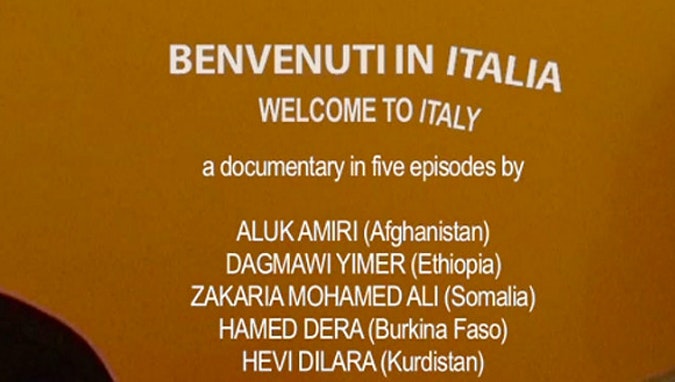Welcome to Italy: Five Filmmakers, One Film
By Will Cohen

Dagmawi Yimer, a 33-year-old refugee from Ethiopia, landed in Italy in the summer of 2006. He is one of the five filmmakers behind Benvenuti in Italia (Welcome to Italy), a new documentary that offers a glimpse of migrant life in Italy—from the perspective of the migrants themselves. We invited him to talk a little about the film, which was produced by the Archive of Migrant Memories with the suppport of the Open Society Foundations.
How did you get interested in filmmaking?
When I was in Ethiopia, I never thought my life would bring me to a profession such as filmmaking. But the first problem for a refugee who arrives in a foreign country is one of communication. For me, learning the Italian language was a necessary step to understand the mentality, traditions, and culture of the country that I had ended up with—whether by luck or by choice. But then as a further means of communicating, I also discovered moving images as a powerful way of speaking to Italian society. So that is why I started working with the Archive of Migrant Memories project, which gave me the opportunity to attend a short course on participatory film making. After that, I shot some other documentaries, some myself, some together with other Italian directors.
I wanted to explore and share the experience of reaching that relative endpoint that is Europe. It is only a relative endpoint because arriving in Italy is only the start of a confusing and neverending European puzzle—in particular Italy’s unpreparedness for settling migrants and refugees. This unprepardeness derives only in part from the unwillingness of rightist political parties who nourish fear and hate regarding migrants and foreign communities.
How did the film project get started?
The film project started in February 2011. The first step was to select refugees according to their willingness to get involved in this creative, documentary project. The selected participants were chosen to represent diverse gender and country of origin. As a result 6 refugees were finally recruited; myself from Ethiopia, Zakaria from Somalia, Ahmed from Burkina Faso, Aluk from Afghanistan, a girl named Hevi from Kurdistan and, last but not least, a young man called Svonko, born in Italy but unable to obtain Italian citizenship because he belongs to the allegedly nomadic comunity known as the Roma.
What's the most important idea you hope people take away from the film?
The present film, Benvenuti in Italia (Welcome to Italy), portrays Italian unpreparedness to welcome both migrants and refugees. I believe the project is a unique one in terms of production and distribution methods. Thanks to the variety of participants, and to the individual background of each of them, it became quite an enriching experience to be involved in a group whose only significant link was the one of our common fate: to arrive in Italy, the country and people that interweaved with our own life and destiny.
This is the place where we eventually ended up, and everyone has had their own experience of discovering “Italy,” and was able to construct their own perception of it. The choice of images, frames, and specific stories each of us used to try to narrate also reveals our personal views regarding the issue of Italy vis-à-vis its migrants. During the training period, one could feel a tangible desire of making a multi-faceted documentary film, that desire remained all along until the end. This is why every episode of our documentary has its own touch regarding the pictures, the framings, the approaches, the hesitation and determination of our expressive language, but most importantly the self-image and representation of what it means to be a migrant and a refugee in a country like Italy.
How are you getting the film out to audiences?
The film has been screened in various Italian cinemas for free, and we are still receiving new requests coming from different places and communities.
I know that documentary films, like other advocacy activities, have limits in terms of creating wider awareness of social issues, so we are giving special care to the distribution mechanism itself. At every screening of the film, we ask that at least one of the migrant authors is present in order to take part personally in the debate with the public. The experience of sharing a common place is very important especially here in Italy where it is difficult to find a place where Italians and foreigners can exchange experiences. We live in the same place but our lifes are mostly separate, go in parallel. The presentation of our film in various Italian cities means by itself that every single author of the film can bring not only his/her own documentary to a different audience, but can also take his/her own personal experience to a changing pubblic, which multiplies the impact and the side effects of the film.
We are going to carry out special screenings in schools, something we have started already with satisfaction. I hope our work can continue to close the present gap between us, the migrants, and the local public, and leave a trace of the importance of human diversity in a fast-changing society such as Italy. We want to transmit today’s migrant memories to Italy’s future generations.
Until March 2014, Will Cohen was a senior communications officer with the Open Society Justice Initiative.